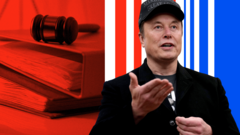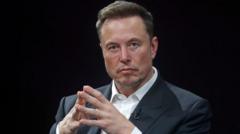In a recent development, Elon Musk has been appointed to lead the Department of Government Efficiency (Doge), an initiative under President Trump's administration aimed at reducing government jobs and spending. Despite facing legal hurdles and criticism, the initiative has garnered significant popular support as it aims to save taxpayers' money and challenge bureaucratic inefficiencies.
Elon Musk’s Controversial Role in Government Spending Cuts: The Doge Initiative Explained

Elon Musk’s Controversial Role in Government Spending Cuts: The Doge Initiative Explained
The newly formed Department of Government Efficiency, led by Elon Musk, is tasked with cutting federal jobs and spending, sparking legal challenges and political debate.
In a surprising move, Elon Musk has taken the helm of a new initiative under the Trump administration named the Department of Government Efficiency, or Doge. Tasked with the daunting goal of trimming the federal workforce and curbing what Musk perceives as wasteful government spending, the initiative has not only stirred political controversy but also faced legal challenges. In a recent press conference held at the Oval Office, Musk defended the initiative amid accusations of a "hostile takeover" of governmental functions from rival political entities.
Doge operates as an advisory body rather than a full-fledged government department, having been established through a presidential executive order. With its mission set to improve federal efficiency through technology upgrades and reduced spending, Doge was mandated to complete its work by July 2026. Importantly, it functions with a minimal staff of just four employees per government agency, many of whom come from tech backgrounds.
While Musk initially claimed he would volunteer in this role, it was later clarified that he operates as an unpaid special government employee. Supporters of Doge argue that its outsider status could lead to more effective change, disentangled from bureaucratic red tape. Nevertheless, critics point out that the initiative selectively targets agencies aligned with Musk and Trump’s ideological stance, leaving others untouched.
So far, Doge has reportedly begun its work by entering various departments to audit spending and identify what it claims are fraudulent practices. Musk highlighted that his team has already saved taxpayers over $1 billion in diversity and inclusion contracts as part of a broader agenda to challenge what he labels as “woke” policies. Additionally, Doge proposed a buyout for two million government employees in an effort to decrease workforce size and targeted the Consumer Financial Protection Bureau, a controversial agency born from the financial crisis of 2008.
Despite polling indicating favorability towards Doge's goals, particularly among Republican voters, legal challenges have arisen from opposition groups who criticize the initiative for its lack of transparency and alleged misinformation campaigns. Critics like former Congressional Budget Office director Douglas Holtz-Eakin claim that the initiative will hinder crucial agencies without providing substantive evidence of its stated successes.
The White House and Musk have dismissed accusations of conflicts of interest, despite the significant engagements of Musk’s businesses with government contracts. Legal suits initiated by unions and attorneys general have sought to stall Doge’s measures, raising questions about its authority and impact on federal operations.
As Musk continues his quest to implement sweeping reforms focused on efficiency and cost-saving, pundits remain skeptical about the feasibility of his ambitions, especially regarding significant cuts to mandatory spending programs. Notably, Elaine Kamark from the Brookings Institution criticized Musk’s tactic of slashing a third of government spending as impractical, citing large portions of the budget are devoted to essential services like Social Security and Medicare.
As the Doge initiative progresses, it remains to be seen whether it will accomplish its goals or provoke deeper political divides within the federal landscape. The journey of Doge under Musk's leadership continues to captivate attention, allowing citizens to weigh in on the effectiveness of Musk’s vision for a more efficient government.
Doge operates as an advisory body rather than a full-fledged government department, having been established through a presidential executive order. With its mission set to improve federal efficiency through technology upgrades and reduced spending, Doge was mandated to complete its work by July 2026. Importantly, it functions with a minimal staff of just four employees per government agency, many of whom come from tech backgrounds.
While Musk initially claimed he would volunteer in this role, it was later clarified that he operates as an unpaid special government employee. Supporters of Doge argue that its outsider status could lead to more effective change, disentangled from bureaucratic red tape. Nevertheless, critics point out that the initiative selectively targets agencies aligned with Musk and Trump’s ideological stance, leaving others untouched.
So far, Doge has reportedly begun its work by entering various departments to audit spending and identify what it claims are fraudulent practices. Musk highlighted that his team has already saved taxpayers over $1 billion in diversity and inclusion contracts as part of a broader agenda to challenge what he labels as “woke” policies. Additionally, Doge proposed a buyout for two million government employees in an effort to decrease workforce size and targeted the Consumer Financial Protection Bureau, a controversial agency born from the financial crisis of 2008.
Despite polling indicating favorability towards Doge's goals, particularly among Republican voters, legal challenges have arisen from opposition groups who criticize the initiative for its lack of transparency and alleged misinformation campaigns. Critics like former Congressional Budget Office director Douglas Holtz-Eakin claim that the initiative will hinder crucial agencies without providing substantive evidence of its stated successes.
The White House and Musk have dismissed accusations of conflicts of interest, despite the significant engagements of Musk’s businesses with government contracts. Legal suits initiated by unions and attorneys general have sought to stall Doge’s measures, raising questions about its authority and impact on federal operations.
As Musk continues his quest to implement sweeping reforms focused on efficiency and cost-saving, pundits remain skeptical about the feasibility of his ambitions, especially regarding significant cuts to mandatory spending programs. Notably, Elaine Kamark from the Brookings Institution criticized Musk’s tactic of slashing a third of government spending as impractical, citing large portions of the budget are devoted to essential services like Social Security and Medicare.
As the Doge initiative progresses, it remains to be seen whether it will accomplish its goals or provoke deeper political divides within the federal landscape. The journey of Doge under Musk's leadership continues to captivate attention, allowing citizens to weigh in on the effectiveness of Musk’s vision for a more efficient government.



















